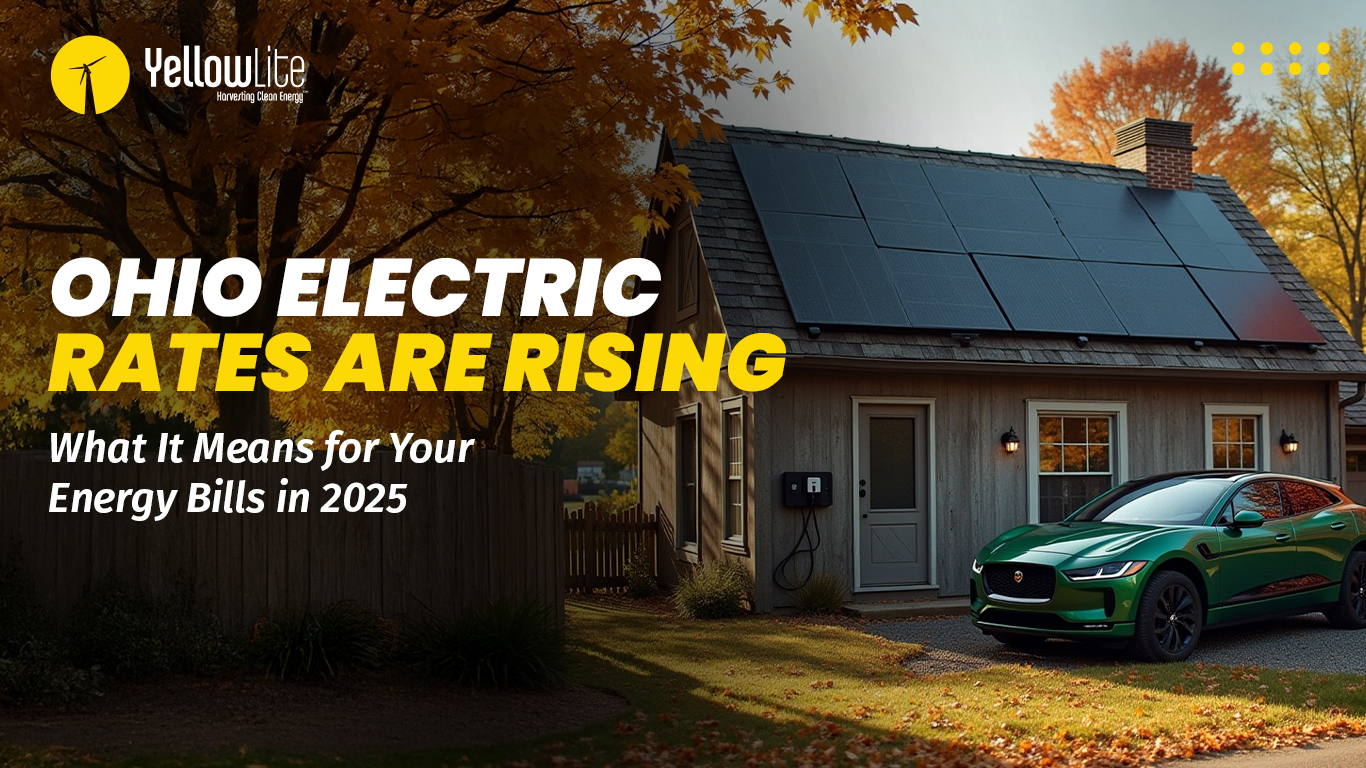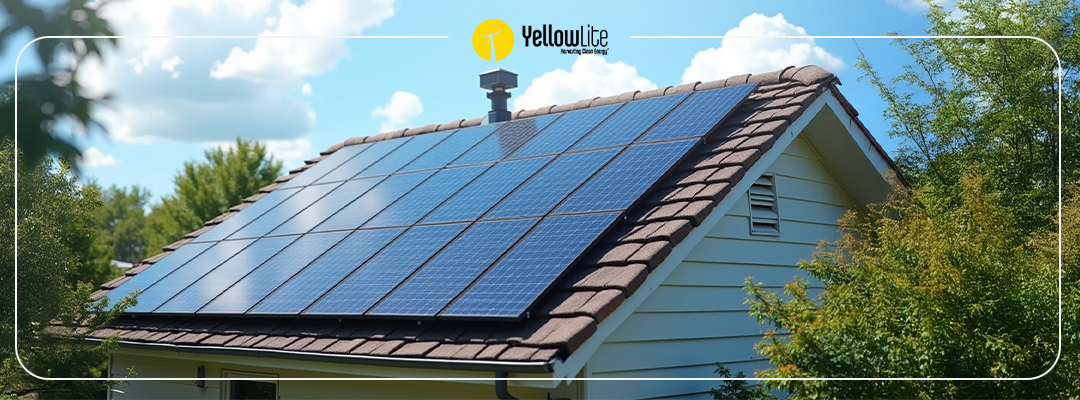One of the first questions our finance-savvy customers ask is how solar panels will affect the resale value of their homes. We understand that the home you’re considering for solar might not be a forever home, or it could be an investment property you plan to resell. You may have already installed solar and are wondering what kind of premium, if any, solar panels have added to your home’s value.
In this blog, we’ll shed some light on the financial implications of installing solar panels on your residential property.
Ohio homes may offer a solar premium
Studies find that nearly 25% of solar-powered homes are likely to sell over the asking price and spend 13.3% less time on the market. On average, homes with solar panels sell for 4.1% more than comparable homes without solar power. But does this premium apply to the properties in your market?
Areas with favorable conditions for solar energy development tend to see a higher impact on home values. Sunny weather, strong solar incentives such as tax credits, or net metering programs. and high electricity costs all contribute to these favorable conditions.
So what about Ohio?
Ohio is an emerging solar market, with residential installations climbing in recent years. The state is expected to add over 7,782 MW of solar power over the next 5 years, 7th out of all states.
Electricity prices are high in Ohio
Ohio's average electricity price is 14.33 c/kWh, which ranks 26th among all states. That is to say, electricity prices are high and only getting higher. Consider that the average electricity bill in Ohio is $107.30/month, and bills get especially high in the winter. When home buyers see solar panels on a home, they recognize an opportunity to save money.
Ohio offers just over 4 average sunlight hours daily
Ohio offers an average of 4.2 hours of daily sunlight. This isn’t the 5-6 hours of some states leading the solar charge, but adding a solar battery to your installation will allow you to store your energy and use it during overcast or snowy weather. Storage-backed systems are especially attractive to buyers in colder climates because they ensure electricity is available during inevitable power outages.
Ohio offers a variety of financial incentives
Financial benefits are the most common reason homeowners say they’re going solar.
Ohioans can apply the Federal Solar Tax Credit to solar installations. It’s a dollar-for-dollar tax credit that allows U.S. homeowners to write off 30% of solar installations completed between 2022-2032.
Net metering and Solar Renewable Energy Credits (SRECs) are two ways Ohioans offset their upfront costs by getting credit for their stored excess solar energy. Net metering is typically applied to upcoming energy bills, while SRECs can be sold for cash.
Clevelanders and Cincinattians who go solar will only be required to pay taxes on the pre-improvement value of their property for up to 10-15 years. Check with your city to find out if you have a similar program available.
There are a variety of loans available to Ohioans interested in going solar, including the Eco-link Program, which offers Ohioans a 3% loan rate reduction, and Hamilton County Home Improvement Program (HIP) loans, which affords the same discount to homeowners in the Hamilton County area.
Financial benefits are the most common reason homeowners say they’re going solar.
While Ohio doesn’t have the sunny weather of some of the top solar states, it’s high electricity prices, and widely available incentives make it an emerging solar market.
Why it pays to get a home appraisal
An appraisal is a written document that shows a third-party opinion of the fair market value of a home.
Appraisals that are updated to include solar panels benefit all parties involved with the property, including homeowners, potential buyers, realtors involved in selling the property, and potential lenders.
Lenders may be more willing to provide mortgages for properties with solar panels, especially if the appraised value reflects their financial benefits. A higher appraised value can also make properties more attractive to potential buyers. Potential buyers with access to an accurate appraisal and an understanding of the value of an existing solar system will better grasp the return on investment (ROI) and payback period for their solar panel installation. Realtors with updated information that includes solar panels can provide appropriate guidance to their clients based on the home's actual value.
As solar energy becomes more mainstream, there is a growing awareness of the need to accurately account for the value of solar installations in property appraisals.
In the meantime, providing them with as much information as possible about your system is vital to ensure your home is appropriately evaluated. You should include:
- The system capacity (in kW)
- The installation date
- Whether the system is leased or owned
- Actual or projected energy production
- The discounted cash flows that the system will generate
- Whether the system is secured by a UCC-1 lien
- The system’s warranties
- The panel manufacturer
By getting your home appraised with your solar panels, you’re protecting your investment and giving any parties involved in the future sale of your home all the information they need to assess its value accurately.
Aesthetic considerations play a role
The reality is that only some buyers have the same aesthetic taste as you. And there are more choices for solar panels than there were, even ten years ago.
The impact of your solar panels on property value may be negligible or negative with some buyers.
You have some options if you want solar, but you’re concerned about limiting your buyer pool. You could opt for sleek, all-black solar panels if you feel they look better with the style of your home and have more curb appeal. If you’d prefer not to avoid rooftop solar panels and have room on your property, you may be able to go with ground-mounted solar panels. Consult with a legal or real estate professional to confirm that ground-mounted solar panels offer the same premium as roof-mounted solar.
The ownership model impacts added value
The ownership model of solar panels can also affect property value. If the homeowner owns the solar system outright, it is more likely to add value to the property than a leased system, as potential buyers may need to assume the lease or consider it in their decision.
Let’s compare a buyer’s perception of an owned vs leased solar system.
Owned solar panels
Buyers often see owned solar panels as more valuable because they can take full advantage of lower electricity bills and a return on investment over time due to financial incentives like net metering. The increase in home value alone can sometimes exceed the initial cost of the solar installation.
By owning solar panels, homeowners realize their full financial benefit.
Leased Solar Panels
Leased solar panels can have a mixed impact on property value. Some potential buyers may view them as a cost-saving feature, while others may see the lease as a possible financial obligation.
The impact of leased solar panels on property value may depend on the transferability of the lease to the new homeowner. If the lease is transferable and the terms are attractive, it can be a selling point. If the lease is transferable or has favorable terms, it can deter some buyers.
The main disadvantage with leased solar panels is that homeowners do not typically benefit from incentives and tax credits, as the solar leasing company often claims them. Considering the top selling point for solar panels is their financial benefits, this could be a tough hill to climb.
In sum, owned solar panels positively impact home value, as they offer the benefits of energy savings, increased resale value, and ownership of incentives. If you plan to sell your home with leased panels, be upfront with buyers. Providing detailed information about the lease terms and any potential financial benefits to prospective buyers is the way to go.
Studies show that solar panels can add a premium to your home’s value. The extent of this premium depends on several factors, including location, the ownership model of your solar panels, and the aesthetics of your system.
Let the sunshine in
States with favorable conditions for solar energy development and higher electricity costs see a greater benefit from solar panels. Researching local real estate trends and consulting with real estate professionals and solar experts is essential.
Getting a home appraisal is a wise move. An accurate appraisal protects your investment and benefits potential buyers, lenders, and real estate professionals. It provides crucial information about the added value of your solar system, making it easier for all parties involved with the sale to assess your home’s value accurately.
Aesthetic considerations also play a role in how solar panels affect property value. You can opt for ground-mounted or all-black panels if you are concerned that standard rooftop panels won’t be attractive to buyers in your area.
Finally, the ownership model of your panels can impact property value. Owned solar panels are generally preferable to leased ones as they offer homeowners the full financial benefits, including lower electricity bills and increased home value.

Get it right with Yellowlite
Do you have any more questions about how installing solar panels will affect the value of your home? Already have panels and just looking for an expert opinion? Contact our pro-solar experts today, and we’ll be happy to help.



